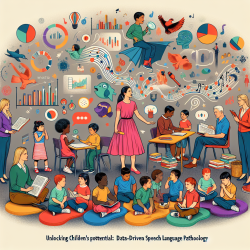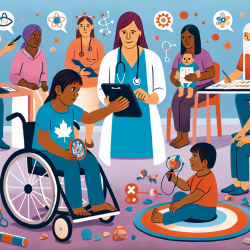As a speech-language pathologist (SLP) dedicated to creating great outcomes for children, I am passionate about using data-driven decisions to inform my practice. This approach ensures that the interventions we implement are effective and tailored to each child's unique needs. In this blog, I will discuss the importance of data-driven decisions in speech-language pathology and how they can unlock the potential of children.
The Importance of Data-Driven Decisions
Data-driven decisions are essential in speech-language pathology for several reasons:
- Individualized Interventions: By collecting and analyzing data, SLPs can develop personalized treatment plans that address the specific needs of each child.
- Measurable Progress: Data allows us to track progress over time, ensuring that interventions are effective and making necessary adjustments when needed.
- Evidence-Based Practice: Utilizing data supports the use of evidence-based practices, which are proven to be effective through research and clinical trials.
- Accountability: Data provides a transparent way to demonstrate the effectiveness of our interventions to parents, educators, and other stakeholders.
Collecting Data: The First Step
The first step in making data-driven decisions is collecting accurate and relevant data. This can be achieved through various methods, including:
- Standardized Assessments: These assessments provide a baseline for a child's abilities and can be used to measure progress over time.
- Observations: Observing a child in different settings (e.g., classroom, home) can provide valuable insights into their communication skills and challenges.
- Parent and Teacher Reports: Input from parents and teachers can offer a comprehensive view of a child's abilities and needs.
- Progress Monitoring Tools: Regularly tracking a child's progress using specific tools can help identify areas of improvement and areas needing additional support.
Analyzing Data: Turning Information into Action
Once data is collected, the next step is analyzing it to inform our interventions. This involves:
- Identifying Patterns: Analyzing data can reveal patterns in a child's communication skills, such as strengths and weaknesses.
- Setting Goals: Based on the data, we can set specific, measurable, achievable, relevant, and time-bound (SMART) goals for the child's progress.
- Developing Intervention Plans: Data helps us create targeted intervention plans that address the child's unique needs and challenges.
- Adjusting Interventions: Continuous data analysis allows us to make real-time adjustments to interventions, ensuring they remain effective.
Case Study: Success Through Data-Driven Decisions
Consider the case of a child named Emma, who struggled with expressive language skills. Through data-driven decision-making, we were able to create a personalized intervention plan for her. Here is how we did it:
- Initial Assessment: We conducted standardized assessments and gathered input from Emma's parents and teachers.
- Data Analysis: The data revealed that Emma had difficulty forming complete sentences and using appropriate vocabulary.
- Goal Setting: We set SMART goals for Emma, such as increasing her sentence length and vocabulary usage.
- Intervention Plan: We developed a targeted intervention plan that included specific activities and exercises to address Emma's needs.
- Progress Monitoring: Regular data collection and analysis allowed us to track Emma's progress and make necessary adjustments to her intervention plan.
Over time, Emma made significant improvements in her expressive language skills, demonstrating the power of data-driven decisions in speech-language pathology.
Conclusion
Data-driven decisions are crucial in speech-language pathology to ensure that our interventions are effective and tailored to each child's unique needs. By collecting and analyzing data, we can unlock the potential of children and help them achieve their communication goals. As SLPs, it is our responsibility to use data to inform our practice and create the best possible outcomes for the children we serve.










